War Widows Honour Roll
A collective tribute of the stories of love, courage, and resilience
This War Widows Honour Roll is a living tribute to the women who have carried the legacy of service with courage and strength.
Each story honours a life shaped by service and sacrifice, told through the words of family, friends, and community.
Browse the tributes below to read the stories and view the photographs of war widows connected to our defence community.
Each entry reflects the lasting impact of their courage, care, and contribution.
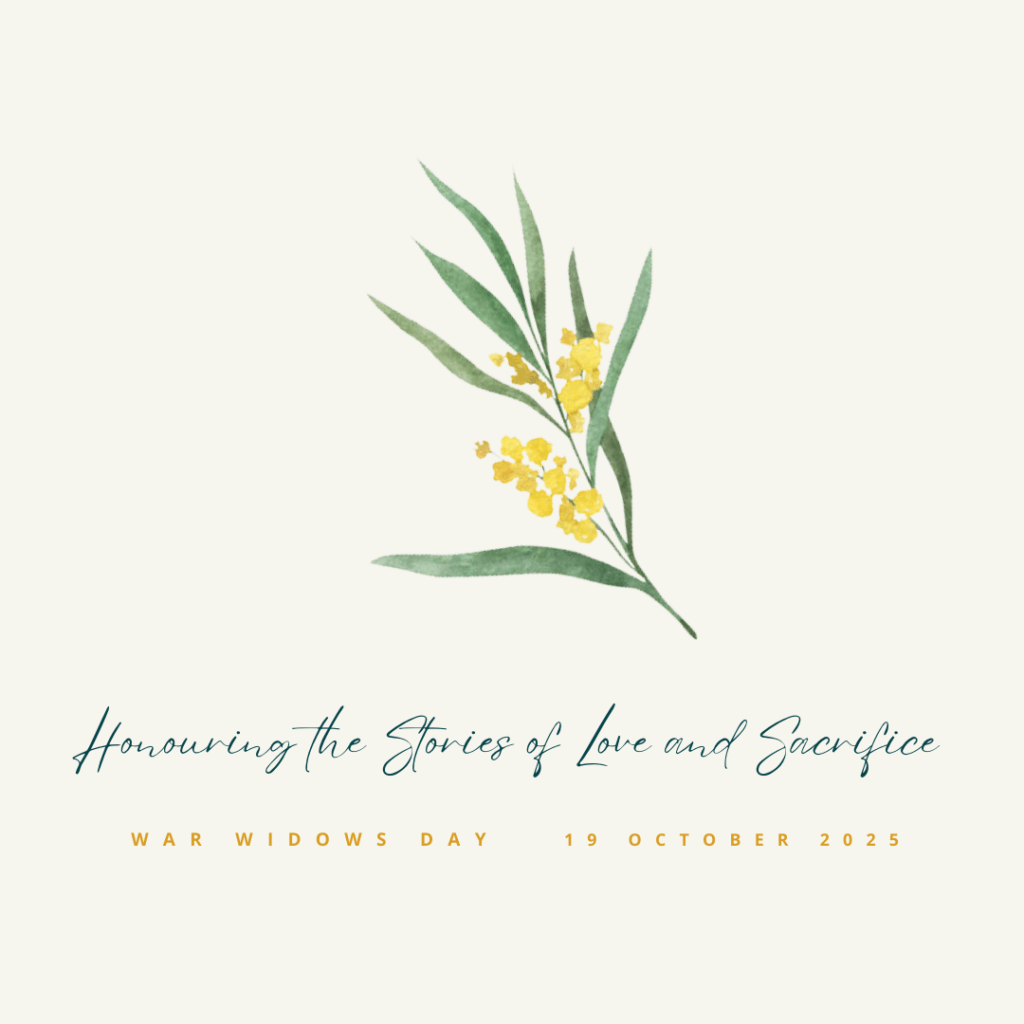
Ruby Emily Terry
Ruby Emily Terry devoted her life to supporting her WWI veteran husband, Rupert James Terry of the Fifth Battalion, Second Division AIF. She stood by him through the lasting effects of shell shock from 1917, offering unwavering love and emotional strength. Ruby’s dedication extended beyond her husband to his mates, showing deep respect for all veterans. Her devotion gave Rupert comfort and longevity, making Ruby a true hero in her own right.

My mother, Ruby Emily Terry, supported her WWI Veteran husband Rupert James Terry of the Fifth Battalion Second Division AIF for their whole married life and was devoted to him and his mates as well. She regarded veterans with an undying respect and knew of Rupert’s mental and physical wounds through shell shock in 1917, supporting him emotionally and loving him in life and for eternity. Ruby was his rock and extended his life through her love and devotion.
My mother Ruby is a hero just like my father. Rest in peace and Lest We Forget.
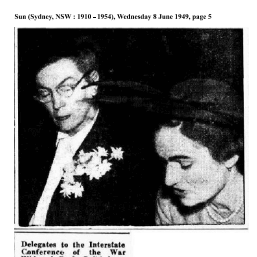
Mary Isabel Edgley
Mary Edgley was an original member of the Guild and served on the Executive Committee and later as Honorary Secretary and Treasurer of the Federal Guild, helping to establish branches across Victoria and New South Wales. Mary represented the Guild on the Canteens Trust Fund, working alongside Defence and Legacy representatives to support veterans and their families. In 1950, she travelled to Europe, meeting the Duchess of Kent, a fellow war widow and Guild Patron. Mary’s leadership and commitment helped build the Guild and improve conditions for widows living in hardship.

In 1950, the basic was was £8/3/, the War Widows’ pension was £5/2/ for a widow with children, below the poverty line. My grandmother, Mary Edgley, was one of the women who fought the long battle to bring dignity to the lives of the women whose husbands never returned from war.
In her own words (from a memoir she wrote for her family in the early 2000s):
In 1945 I was an original member of the War Widows Guild started by Mrs Vasey. I was on the Executive Committee and later, when we became Australia wide and had a Federal Guild, I was Honorary Secretary and Treasurer. A lot of time was spent in opening branches in country Victoria. Details of the Guild are all in the Book “No Mean Destiny”. I enjoyed the work and it filled a gap in my life as well as doing something useful for the War Widows. Preston Motors gave us a Station Wagon and I used to drive Mrs Vasey. We went to country towns to open branches there and when we became a federal guild we went to Sydney to start a guild there. I was our representative on the Canteens Trust Fund. We used to meet at Victoria Barracks once a fortnight to administer the Fund. The Canteens Trust Fund was formed to administer £5 million which was the profit from canteens and an Act of Parliament made it available for returned soldiers and their dependents. The maximum help was £100 a year given as £25 a quarter. Group Captain Anderson was the Chairman. I was the only woman. The other members were from Army, Navy, Air Force and Legacy.
In 1950 I travelled to Europe, while there I went to Buckingham Palace Garden Party as well as having a private meeting with the Duchess of Kent (Princess Marina) at Clarence House. She was a war widow and was a Patron of our Guild. She was lovely to look at and to my surprise spoke with a foreign accent. She was a Cypriot. Our interview lasted an hour and she was interested to hear all details about the Guild. I have always been interested in the Royal Family and was fascinated by all the signs of royalty at Clarence House – a typewriter with a cover saying “His Royal Highness”, Guards at the entrance in uniform who conducted me in to see the Duchess.
Until my trip I had been very dependent, but the trip gave me some self-dependence and confidence. Life before the 2nd World War was very sheltered for women, especially in Strathfield where I grew up. We were not encouraged to have ideas of our own, but just followed whatever everyone else did. I regret not making more of my opportunities. My father said a woman’s place was in the home. This is what I accepted and always have, and up to a point, still do.
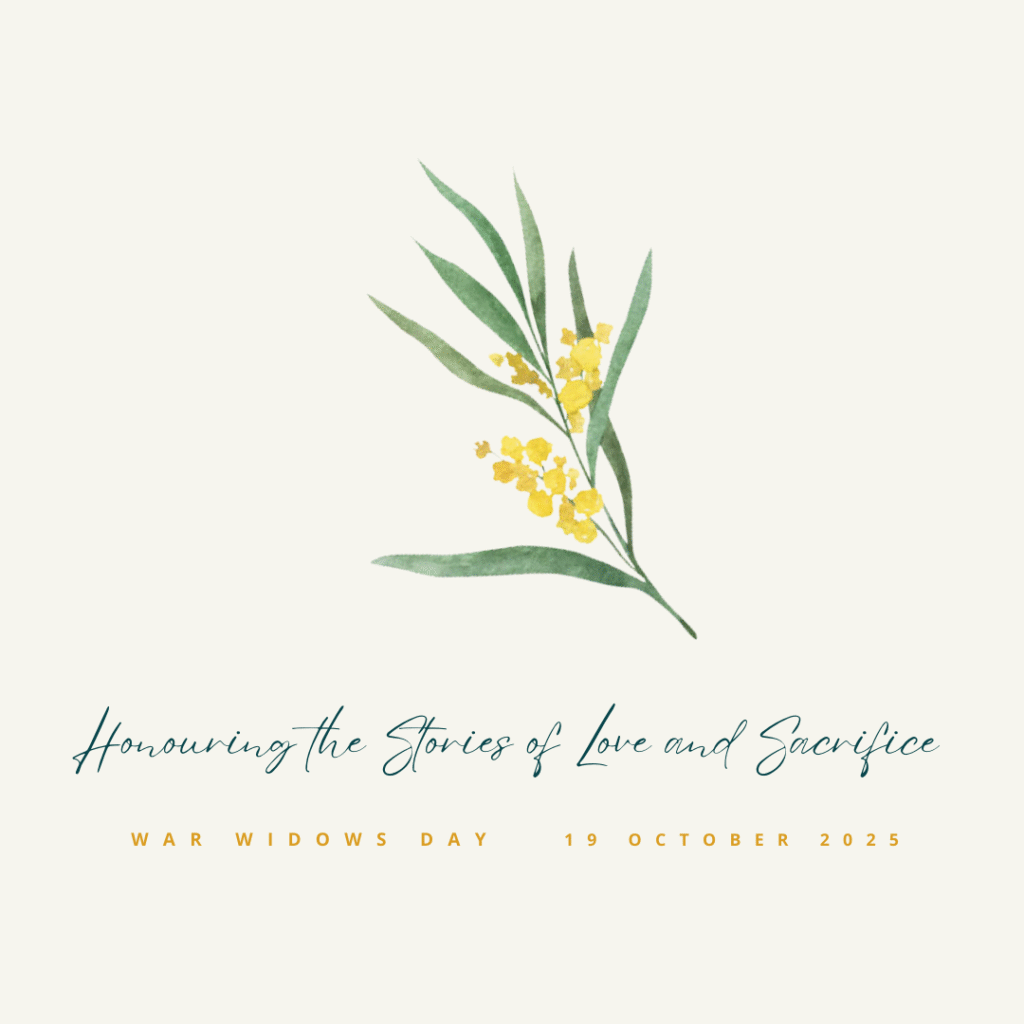
Gwen Gardiner
Gwen married a Royal Australian Air Force veteran in 1946 after meeting during his leave in Melbourne. He returned from New Guinea with malaria and psychological trauma and later struggled with alcoholism. Gwen supported him through his law studies and raised four children while working various jobs as his career faltered. They divorced in 1968 after many separations, meaning she was not eligible for war widow benefits. Her husband died in 1975 aged 54. Gwen continued to be a hard working, resilient woman for both herself and her children, living independently until her death at 83.

My mother Gwen Gardiner did not qualify as a war widow for pension purposes however, she was the wife of a WW2 veteran who she divorced in 1968 due time his long term alcoholism. My parents married in 1946 and met a few years before when my father was in leave in Melbourne. He had served with the RAAF in New Guinea and came back with malaria and psychological damage.
They were very much in love when they married and my father stayed in the RAAF until about 1947. My mother then supported him financially while my father did a law degree . I was born in 1949 and he graduated around 1950. My father had a chequered career as a lawyer as he had a serious problem with alcohol. He got jobs and lost them and we travelled each time he had a new job. I had three younger siblings all born in different towns. My father sought treatment for alcoholism and each time we had hope it would last but it didn’t. They separated many times and reconciled and my mother was never eligible for government assistance. She worked in many different jobs, cooking, cleaning, retail and brought up four children with little assistance from my father.
She was always hoping he would change but he was a committed alcoholic and she did not divorce him until 1968 when I was 18. That divorce meant she lost any entitlement to a war widows pension despite many years of a troubled marriage and four children. My father died in 1975 aged 54. He had not worked as a lawyer since 1958 and died leaving nothing. I don’t know if he ever received a government pension as a veteran but I know that his wife and children received no assistance and that my mother was never considered a war widows.
I’m sure that this is not an unusual story. Many men were damaged by war service and their families suffered but divorce meant all entitlements were lost. Maybe it is different today, I don’t know, but I do know that my mother worked hard until aged 60 when she was entitled to the age pension. She made a good life for herself and brought up four children. My mother died aged 83, she never re-married.
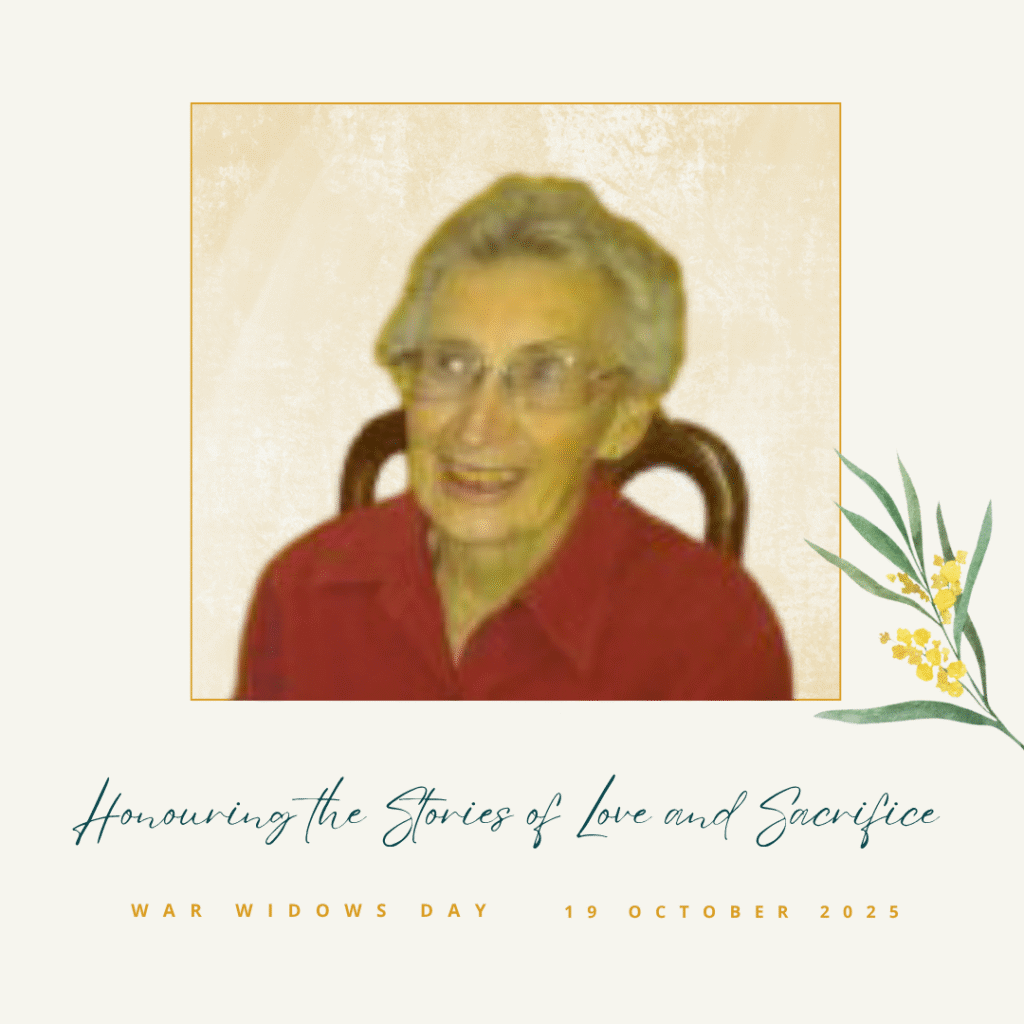
Joan Lois Adams nee Callcott
Joan was only beginning school as the Second World War broke out. She married Ross Adams, a veteran of the 2/16th Battalion who served in Papua New Guinea and Balikpapan and lived with the lasting effects of war. Joan held her family together, raising three children through hardship and violence. After caring for Ross for 14 years until his death, she was recruited into the War Widows Guild of the City of Wollongong supporting stroke survivors. Joan did her best for her kids, and was loving Nan to her grandchildren, refusing to let the burden of service affect her relationship with her family.

Joan was in Primary School when WW2 broke out in 1939 – most of her school years were against the backdrop of the WW2 years.
In late 1953, Joan married Cyril Ross Adams who, as a teenager, had served with the 2/16th Battalion in the horrific conflicts on the Northern Beach Heads of PNG in 1942- 1943. These are still all to often overshadowed by Kokoda. Ross then returned to PNG later in 1943, and at Balikpapan in 1945 – suffering the physical and psychological impacts for the rest of his life.
Fifteen years after WW2 ended, in 1960, husband Ross really began to experience PTSD, self medicating with alcohol, and Joan had to be mother and father to their 3 children, against the physical and psychological impacts of alcohol fuelled violence. But rather than being ground down, Joan served her community in a whole range of community groups from the early 1960’s until her own health began to break down in 2005.
Joan also inspired her children with the thoughts of doing the best you can with the abilities you have been given, and the opportunities that come your way. Nevertheless life was hard for Joan and their three kids, like so many kids whose dads suffered from PTSD after WW2 – yet families were expected to keep it “under the carpet” and within “the four walls of their own homes”.
Husband Ross’s PTSD culminated in him leaving the family in 1975, yet after his debilitating stroke in 1977, Joan brought Ross back home, and cared for him for over 14 years until his death in 1990, limiting her own life’s activities during those years. They joined the local stroke support group – which Joan continued to support as an office bearer, for 15 years after the passing of Ross.
And, after the passing of Ross in 1990, Joan’s aunt recruited her into the War Widows Guild of the City of Wollongong. There, Joan quickly became an office bearer for many years, ultimately compiling its 50 year history 1954 – 2004. She also lobbied for the establishment of stroke support facilities at the local Wollongong Hospital.
Life could never have been a normal happy household for the three children of the Adams household from the 1960’s. Back then there was no support for a young wife and mother with a husband afflicted with PTSD – an understanding of that would only come after the Vietnam War years. Yet Joan did her best for her kids, and found time to be a loving Nan to her 4 grandchildren – even taking one of them along to War Widows and Woonona Bulli RSL Laurel Club meetings.
Now, as a former Local Council Alderman, I honour Mum, Joan Adams nee Callcott, when I do presentations on “What did you do in the War (WW2) and Afterwards Mummy?”
Lest We Forget.
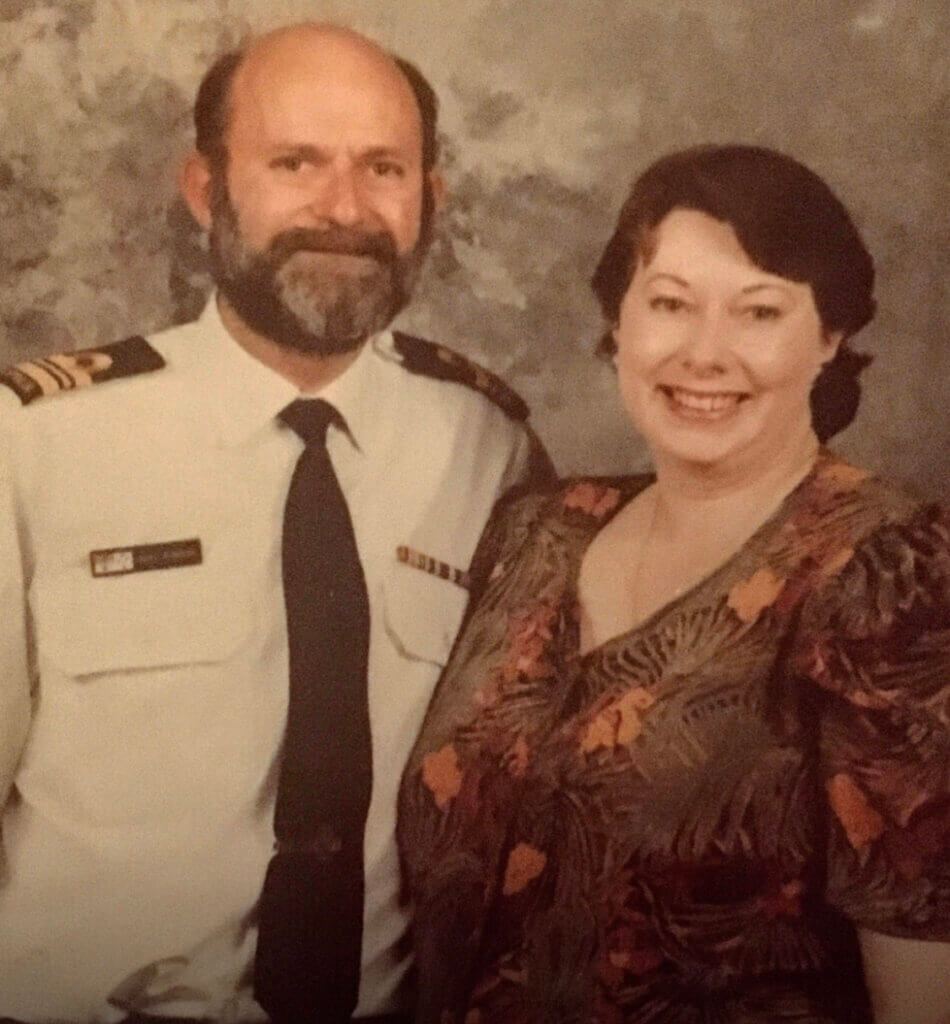
Jo Burgess
Jo became a war widow on 11 March 2024 after the passing of her husband, Noel. Noel served 44 years in the Royal Australian Navy, beginning as an apprentice carpenter at 15 and rising to Lieutenant Commander. They met in Sydney and married a year later in Brisbane with a traditional naval wedding. Through long deployments and family life with 4 children, Jo was able to stay strong and care for their children alone for long periods. Jo values the war widows in her community that showed their support. She helps them as they help her, through the shared understanding and common grief of defence…

Jo’s husband Noel Burgess passed away on 11th March 2024. They had 4 children and 5 grandchildren and were married for 46 years.
Noel served in the Royal Australian Navy for 44 years. He joined up as a Naval Apprentice Carpenter (“Chippy”) at the tender Age of 15 years. Jo recalls how unfortunately he was not a very good “Chippy”, so he rejoined the Navy as a general recruit aged 17 years. He went on to become Chief Petty Officer (Meteorological branch.)
Eventually he was sent to the United Kingdom to become an “officer and a gentleman.” It was later in his return that Jo met him as a lieutenant when he was on leave in Sydney. She was also in Sydney from Brisbane, staying with a friend who was also in the Navy. Her friend became sick and was taken to the Naval Hospital at HMAS Penguin. Noel rang up to ask Jo out to dinner, and the rest, as they say, was history!
They married a year later in Brisbane with a traditional Naval wedding with crossed swords etc.
Noel in his Naval career served in the Malayan Conflict, Borneo, and Vietnam. He also served in the Royal Australian Naval Reserve in the first Gulf War in Naval Control of Merchant Shipping. Jo was able to care for their 4 children during his deployments, staying strong for their family in tough times.
Noel retired from the Navy as a Lieutenant Commander. He was 82 years old when he passed away.
Jo joined her local War Widows after another Navy wife and widow told her about the benefits. She met a welcoming group of ladies who all had their own stories; but were generous as they shared their support. Jo believes there is such a generational bonding and understanding through common grief.

Lillian Freeman
I would like to share the story of my grandmother Lillian, a war widow. She would be 110 if she were still alive today. She was the wife of World War II veteran Lionel Freeman and joined the Guild after his death in 1969. Lionel served in Timor and later fought with the 2/2 Independent Company. His experiences left scars that affected the family, but Lillian held everyone together with strength and calm. She raised four children and carried on without complaint. Working with the Guild now, I see her in the women we support and understand the importance of what she helped build.

I would like to share the story of my grandmother, a war widow.
It’s funny how life pans out sometimes…
Apple founder Steve Jobs said it perfectly, at his Commencement address to the new Stanford University class of 2005.
“You can’t connect the dots looking forward; you can only connect them looking backward,” he said. “So you have to trust that the dots will somehow connect in your future. You have to trust in something – your gut, destiny, life, karma, whatever.”
For me, finding myself here at the Guild has given me a totally new perspective and certainly echoes Jobs’ sentiments.
My grandmother Lillian Freeman would be 110 if she were still alive today. The wife of World War II veteran Lionel Freeman, she became a member of the War Widows Guild in July 1969, not long after Lionel’s death.
Lionel struggled following his war service, in what today would be categorised as post-traumatic stress. He served in Timor as a gunner with the 2/1 Heavy Battery, Royal Australian Artillery, until the island was overrun by the Japanese.
Avoiding capture – many of his unit endured years of hardship on the Burma-Thai Railway, including his future brother-in-law, the sibling of Lillian – he joined the 2/2 Independent Company and fought behind the lines during the campaign with this infamous commando unit.
Lionel married Lillian – who he met while she searched for information on her captured brother, Gordon Kinred, who served in the 2/1 Fortresses Signals, a sister unit of the 2/1 Heavy Battery.
Together they had four children, and they all started life together living at Hargrave Park, an old army barracks turned rough and tumble housing for veterans as they awaited housing commission accommodation.
Several years later the family secured a new housing commission house in Yagoona, which is where my mother, Maureen, along with her siblings Rex, Patricia and Riki all grew up. This was the family home and where my grandmother resided for the remainder of her life.
I remember my grandmother – who was universally called Bar by all – and mother talking about the War Widows, but it was something I didn’t take too much notice of at the time. My memories are of someone picking up Bar to take her to the ANZAC Day march in town and the gatherings she would go to with other widows. I wish I took more interest in hindsight, but that’s just part of my dot-joining journey…
Bar was the glue that held her immediate, and extended as it grew bigger, family together. She was the matriarch. Firm when she needed to be firm, stoic, and I can’t remember her ever speaking ill of anyone. I think we could all be more like Bar. She was a product of her era when resilience was not really a word people used. You just were, because you had to be.
The much-loved Lionel certainly had his challenges post-service and never really recovered from the impact of the trauma he experienced in Timor – which was not physical, but psychological. The family always chipped in when he needed support, offering a shoulder to lean on, underpinned by the ever-present and venerable Bar.
I see a lot of Bar in the many World War II widows the Guild continues to support today. It gives me comfort to see how our group offers a steady hand of support when needed.
The nature of conflict unfortunately means we have new generations of widows joining our group, with many Vietnam War veterans’ wives part of our cohort, as well as those widows from more recent conflicts, including Afghanistan.
Our relevance today is as significant as it always has been. It gives me great privilege to be part of this organisation and see first-hand the impact we can make for those that require support.
I never thought my career would take me to this juncture. As a granddaughter of a war widow who benefited so much from the ‘Guild’ as Bar used to call it, I now have my opportunity to play my small part in continuing the work of protecting the interests of women and families united by defence service.
This gives me immense satisfaction and I look forward to connecting with more of our members over the years ahead.
Cherie Perceval, Executive Officer, Families of Veterans Guild.
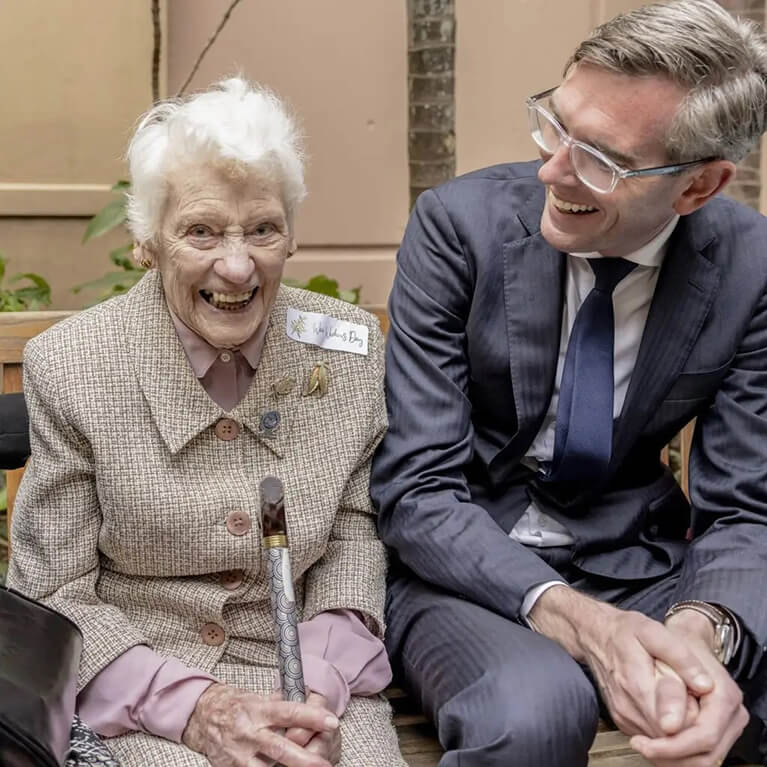
Margaret Tanner
Margaret Tanner became a war widow at 29 after her husband Noel, a WWII serviceman passed from illness related to his service. She raised their son alone and, in 1951, joined Australian War Widows NSW, where she built lifelong friendships and found strength through the support of other widows. Margaret remained active in her community well into her 100s, building friendships, attending events, and supporting other war widows. She reflected on the challenges younger widows face, from grief to family responsibilities, and valued the connections and support provided by the Guild, recognising how vital these networks are for families affected by service.

Community and connection key to a happy life
At 103 years old, Margaret Tanner is one of Australia’s oldest war widows.
Her husband, Noel Tanner, served in World War Two as the skipper of a boat that transferred people and supplies from the mainland of Australia to Thursday Island.
A few years after the war ended, Noel became ill with testicular cancer, which was attributed to his war service. He passed away in October 1949, after a short battle with cancer. At 29 years old, Margaret became a war widow and sole parent to their young son, Robert.
It’s been more than 70 years since Margaret lost her husband. She admits, when he first passed away, she would cry herself to sleep. But her strength, resilience and fierce independence are both impressive and inspiring.
Margaret never remarried, but her life has been filled with family and friends, community and connection.
Today, Margaret still lives by herself in her own home. And just a few years ago, she was still playing golf, taking part in a walking group and doing yoga.
When asked the secrets to a long life, Margaret says she doesn’t know. But it seems her willingness to try new things and meet new people is one of them.
She admits she has felt hesitant at times. Her life circumstances have meant she has often had to attend events by herself. Sometimes the thought of showing up to an event on her own, where she doesn’t know anyone else, has made her feel uneasy, but she didn’t let it stop her from getting out there and living life.
“When you’re on your own attending things, you’re always a bit nervous about it,” says Margaret. “But I always made the effort. It’s very daunting, but once I got there, I always met someone that I got on with.”
There were two types of events where Margaret especially made friends: Legacy events and War Widows Social Club meetings.
Margaret joined Australian War Widows NSW in 1951 and started attending the City Evening group at Sydney RSL when it formed in 1968, after her friend and fellow war widow, Betty Bromley, talked her into going.
“I have really enjoyed my involvement with War Widows,” Margaret says. “Some of my best friends were from War Widows or Legacy.”
Ever since that first meeting, Margaret has been involved in AWWNSW, and still attends the Auburn War Widows social club on Saturday afternoons when her health permits.
She also attended the inaugural War Widows Day last year. After the service, while she was waiting for the bus to ferry war widows from Hyde Park to the Parliament of New South Wales, she found herself chatting to the younger war widows.
“It was interesting to see, you know, how they were coping,” Margaret says. By that she means how they were coping with grief, raising children, paying the bills and holding the family together – all without their husband.
When asked how someone overcomes grief and adversity, Margaret shrugs her shoulders and says, “Well, I mean, there’s nothing you can do [about it] really.”
For all the challenges Margaret has faced, what she speaks of most is all the happy memories from the past.
Her dining room displays just a small glimpse of those memories, with photos of all the people she has loved. A photo of her with her sister as young kids, around four and five years old. A photo of her mum and dad. A photo of her dressed in a fancy frock, complete with hat and gloves, alongside her mother-in-law.
Then there is the framed black-and-white photo of a young man, placed in the centre of her dressing table in her bedroom. While Margaret was lucky enough to hold Noel in her arms for just over 10 years, she has held him in her heart for 70 years more.
As well as speaking about all the happy memories, Margaret also expresses her gratitude for all the support, especially from organisations like AWWNSW.
Margaret shares the story of a World War One widow who lived a few doors up from her, who didn’t enjoy the same support Margaret did because Australian War Widows wasn’t created until after World War Two.
“She had no support whatsoever, no support whatsoever,” she says.
“It would have made such a difference to her life if she would have had support. I think we [World War Two widows] are very lucky to have had support. I’ve thought how lucky I was to meet such lovely friends. Even though the war widows meetings are once a month, you look forward to the meetings.”
It’s why, at 103 years old, Margaret still attends the monthly war widows meeting whenever she can.
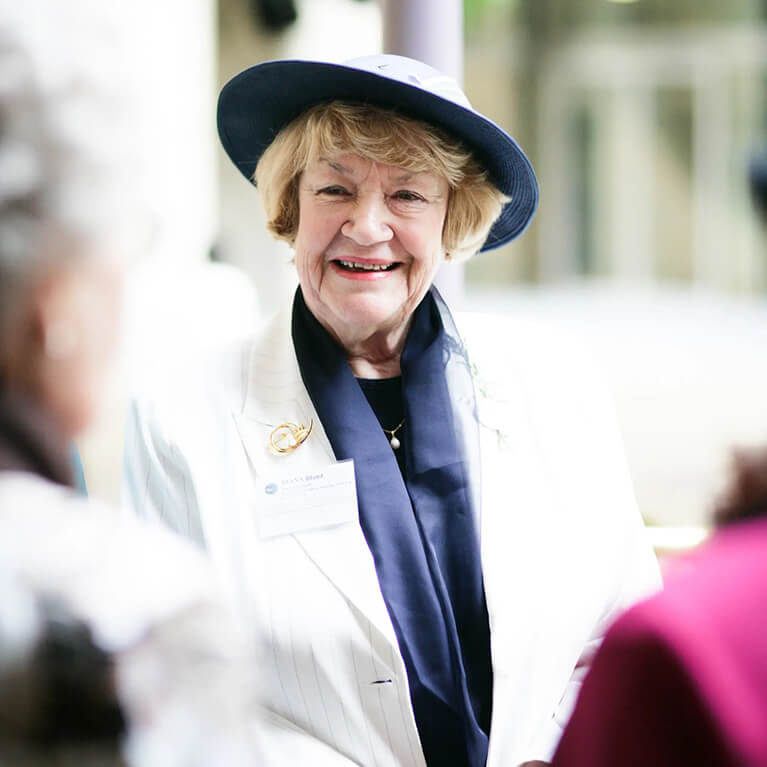
Diana Bland
Diana Bland joined the Guild in 1993 after her husband passed, and dedicated her life to supporting other war widows. She served the Guild at both State and National levels, demonstrating leadership, compassion, and commitment. Diana established and expanded regional clubs, connecting widows across New South Wales and ensuring they felt supported and understood. Even after her official roles ended, she continued to reach out personally, making thousands of calls and sending handwritten cards. Diana believed in the power of connection, mentoring younger widows, and helping them find purpose and companionship. Her work strengthened the Guild and left a lasting legacy of care and community.

Diana Bland joined the Guild in 1993 after her husband passed, and dedicated her life to supporting other war widows. She served the Guild at both State and National levels, demonstrating leadership, compassion, and commitment. Diana established and expanded regional clubs, connecting widows across New South Wales and ensuring they felt supported and understood. Even after her official roles ended, she continued to reach out personally, making thousands of calls and sending handwritten cards. Diana believed in the power of connection, mentoring younger widows, and helping them find purpose and companionship. Her work strengthened the Guild and left a lasting legacy of care and community.
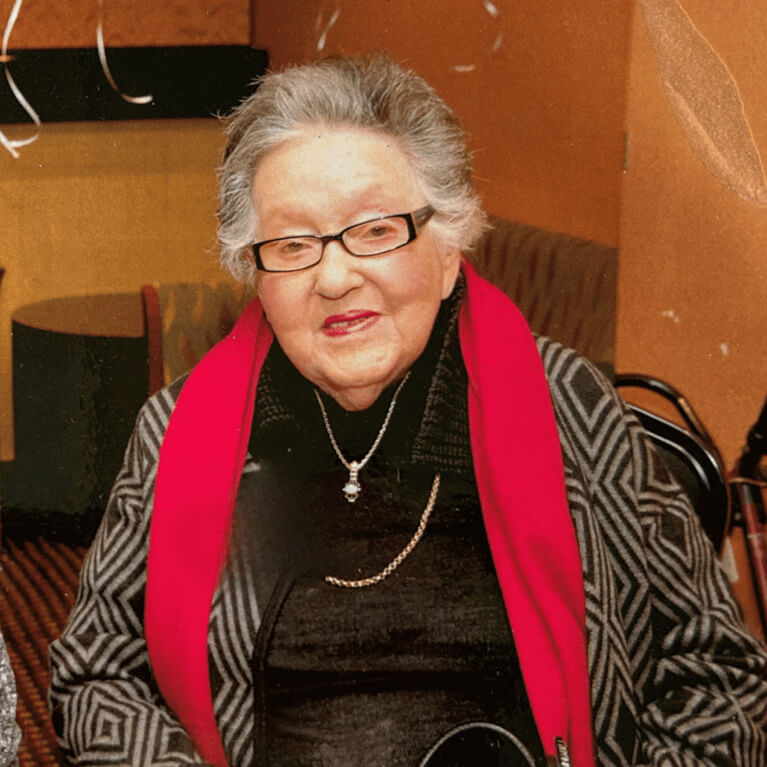
Elizabeth Wright
Elizabeth joined the Guild after her husband Reg, a WWII Spitfire pilot, passed in 2005. She cared for him throughout their marriage and later supported other war widows, becoming coordinator of the Chatswood social club for over ten years. Elizabeth helped organise meetings and fostered connection among members. She spoke openly about the impacts of war on veterans and their families and reflected on the challenges faced by younger service members and their families. She believed more support was needed for those affected by modern conflicts, recognising the ongoing consequences of service on both veterans and their loved ones.

A lifetime of support and sacrifice
“He had lost so much in the war, he couldn’t contemplate the thought of anything happening to her…”
When AWWNSW celebrated Christmas in July at Kirribilli RSL in 2023, Elizabeth Wright was handed the microphone to say a few words as the coordinator of the Chatswood social club.
Just prior to the event, we sat down with Elizabeth at her home to learn more about how she became involved in AWWNSW and to hear her life stories.
It was after the passing of her beloved husband, Reg, in 2005 that Elizabeth joined AWWNSW. Even though it is now almost 20 years since Reg passed away, Elizabeth is overcome with emotion when she speaks of him.
“He was a wonderful man,” says Elizabeth, adding how everyone loved him. “He did not talk about anyone. He didn’t criticise people. He’d seen a different life, and he was really lovely.”
She shares the story of how Reg once helped a young girl from across the street with her schoolwork so she could complete the leaving school certificate. Elizabeth says the young girl’s mother worked odd hours and she didn’t have a father, so Reg stepped in to help her.
Elizabeth says Reg would sit on those tiny little stools at the school, after working a long day, to help this teenage girl with her studies – Shakespeare, maths, and so on. The study paid off and the young girl successfully completed her leaving certificate.
“He was such a nice man,” Elizabeth tells us once more.
When Elizabeth says Reg had seen a different life, she is referring to his war service. Reg served in the Royal Australian Air Force, and served in Europe in the Royal Air Force as a Spitfire pilot throughout the Second World War.
“Imagine his nerves for five-and-a-half years. He could have been shot down any minute, any mission, and he would have been watching others not come back,” Elizabeth says to us. “He went away at 19 [years old] a young boy, and came back a grey-haired man.”
Elizabeth tells us she cared for Reg for the final 20 years of his life, but then concedes, in truth, she cared for him for much longer than that – really for their entire marriage.
After the chaos and catastrophe of war, Reg revelled in peace and quiet. Elizabeth explains how “everything had to be very smooth. He liked the children to be in bed before he came home. He just loved quietness.”
He studied a lot after the war and Elizabeth tells us how he used to go under the house to study alone in peace, even when the ground was saturated with rain.
Elizabeth also recalls how in his younger years, after the war, he would “scream and scream” in his sleep. But later on, as the years continued to pass, he stopped doing so.
When asked why Reg would scream in his sleep, Elizabeth said, “Probably the hate. He hated killing those children and women. You know, they had to [do it] because they were enemies.” She added Reg said to her once how dreadful it was.
Not that Elizabeth pretends to know much about Reg’s war experiences. She tells us several times that Reg didn’t speak much of the war.
“Some men will tell you the whole thing. But he would never, ever say anything.”
He also lived the rest of his life with what we recognise today as anxiety. Elizabeth explains how she never worked again after getting married. She says she would have loved to return to nursing, but Reg worried too much about her if she wasn’t home, and if she had to go somewhere, he would worry constantly.
He had lost so much in the war that he couldn’t contemplate the thought of anything happening to her. He also hated planes and flying. While he never piloted a plane again after returning from war, he put his fears of flying to the side so they could travel around the world together.
“He just had to deal with it,” Elizabeth says. “He didn’t trust anyone else being a pilot.”
Having loved, supported and cared for a war veteran almost her entire adult life, Elizabeth thinks of the younger war widows and partners of war veterans. She speaks of the women, men and families impacted by the modern conflicts of Iraq and Afghanistan, and wonders how they are coping with the aftermath of war.
“I don’t think they’re doing enough for the returned servicemen,” Elizabeth says to us with great compassion.
She also says she did not speak to anyone about how Reg struggled after the war. She supported him silently and stoically. He was a beautiful man, her darling husband: “Everybody loved him, he was an extraordinary man” she tells us.
She is very proud of the family she built with Reg, and of their three daughters.
“The girls said the other day they were so lucky to have such a wonderful father,” she recalls with pride. “We talk about him all the time. We were a very happy family, and we still are.”
As she speaks, it’s clear she is a woman of immense understanding, empathy and compassion. War is brutal and its impacts everlasting.
But she’s grateful for the friendships she’s made with other war widows, who share similar experiences and have walked a similar path.
She says she became the coordinator for the Chatswood social club when no one put their hand up to help. Elizabeth, at the age of 93, stood up and said she could help out.
“I said, well, look, I can sell some raffle tickets and that sort of thing. But I don’t want to be on the committee. I just want to be a helper.” Over 10 years later, at 103 years old, Elizabeth is still – to this day – the coordinator for the AWWNSW Chatswood social club. Simply incredible.
Which brings us back to the AWWNSW 2023 Christmas in July luncheon at Kirribilli RSL.
When Elizabeth was handed the microphone, she thanked members of the social club for sharing their grant funds with other war widows and the RSL for providing the grant to allow them to get together. She spoke about her time as a coordinator, sharing a few anecdotes and stories.
AWWNSW is built on the shoulders and with the efforts of members like Elizabeth, women who have cared for their war veterans and then cared for each other after the passing of their husbands.
It is on this foundation of friendship – supported by understanding, compassion and empathy – that AWWNSW forges into the future.
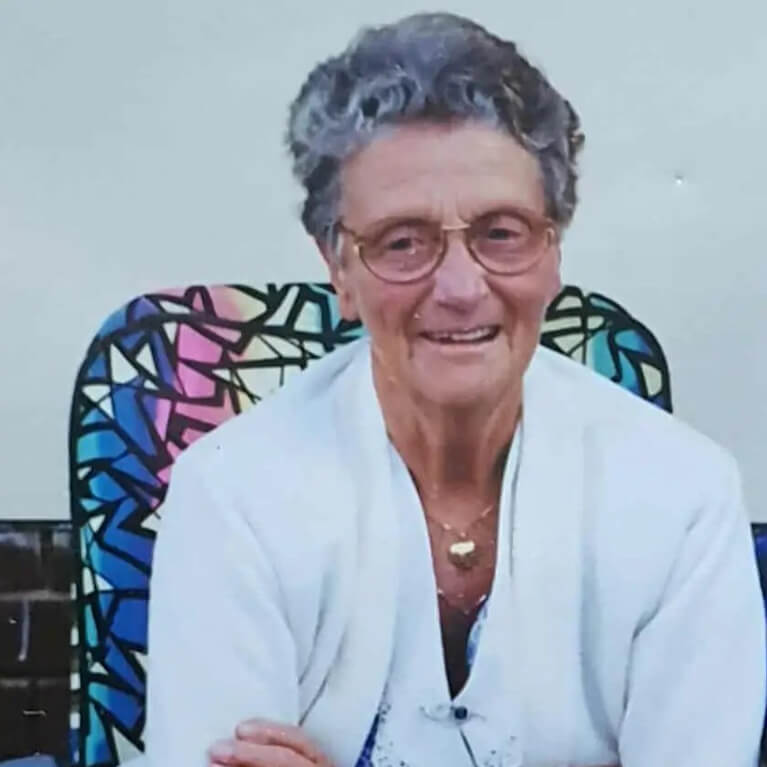
Lorna Callaway
Lorna Callaway was not a woman of many words, but her actions spoke volumes. She became a war widow after the death of her husband Shannon in 1980. Shannon returned from service carrying the unseen wounds of war, which left him unable to work. To provide for their seven sons, Lorna took a job at the local hospital as a laundry maid, where she worked for more than fifty years. She raised her children with love, discipline, and resilience, instilling values that shaped their lives. Lorna’s story reflects the lasting impact of war on families, showing how widows bore heavy burdens with strength and ensured…

Lorna Callaway: A Life of Service and Strength
Lorna Callaway was not a woman of many words, but her actions spoke volumes. She became a war widow after the death of her husband Shannon in 1980. Shannon returned from service carrying the unseen wounds of war, which left him unable to work. To provide for their seven sons, Lorna took a job at the local hospital as a laundry maid, where she worked for more than fifty years. She raised her children with love, discipline, and resilience, instilling values that shaped their lives. Lorna’s story reflects the lasting impact of war on families, showing how widows bore heavy burdens with strength and ensured their families endured despite hardship.
Born and raised in a quiet corner of rural NSW, she would become the heart and soul of her family, her community, and the local hospital where she worked faithfully for over five decades. Her life was not easy—few lives were in those years after World War II—but Lorna carried her burdens with quiet strength and relentless determination.
She married young, just before her husband, Shannon Callaway, shipped off to fight overseas. When the war ended and he came home, the man who had once been full of laughter and life had changed. Like many veterans, he bore invisible wounds. Though the term “PTSD” wasn’t widely known then, Lorna recognized the heaviness in his eyes, the silences that stretched for hours, the sudden starts in the night. He tried to work, but his nerves got the better of him, and he couldn’t hold a job. So Lorna, without complaint, picked up the mantle.
With seven sons to feed, clothe, and raise, Lorna took a job at the local hospital as the laundry maid. It was the only work available at the time, and it didn’t pay much, but it was steady. She did what had to be done. Many occasions she took her younge sons, Flynn and Peter to work as there was no one to care for them.
Lorna would come home exhausted, her hands red and cracked from being in water, but her boys never went without a meal. Her house was always full—full of noise, of chaos, of growing boys—but also full of love. She raised her sons to work hard, respect others, and look after each other, and each of them carried her lessons into their own lives. She became a war widow following the death of her husband in 1980.
My aunty Lorna may never have appeared in history books, but to those who knew her—to the hospital staff, her community and especially to her seven boys—she was a hero. Not the kind with medals, but the kind who held the family to gether no matter what challenges face her, She died peacfully in 2007 aged 89.
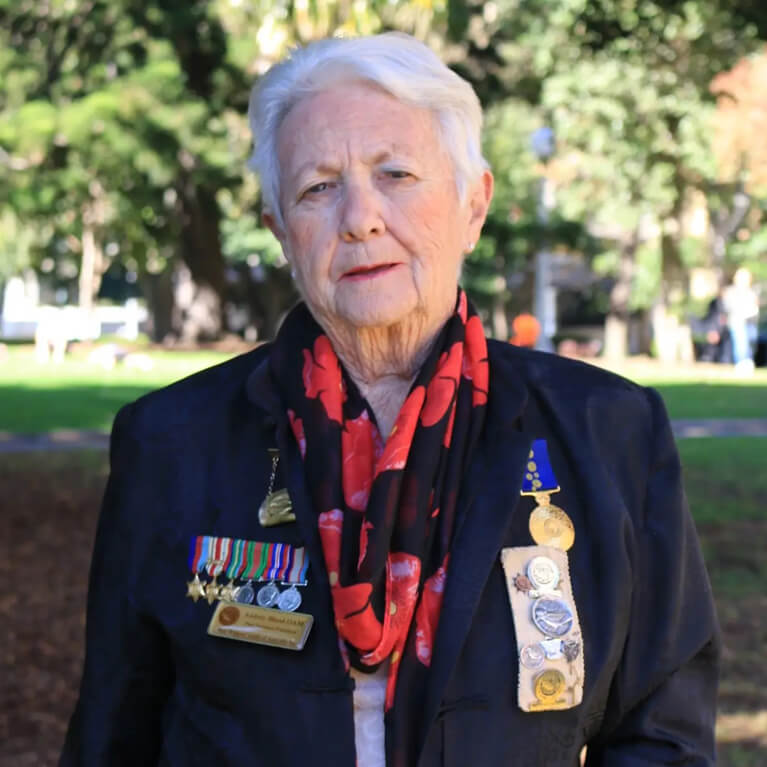
Audrey Blood OAM
Audrey Blood OAM joined the Guild in 1986 and began volunteering in 1989, dedicating 30 years to supporting war widows, bereaved parents, and families affected by illness. She served as State and National President, demonstrating leadership, compassion, and care. Audrey was known for making every widow feel welcome and encouraging the best in them, setting the tone for the Guild through her presence and commitment. Even after her official roles ended, she continued her service, remaining active and visible in the community. Audrey’s work strengthened the organisation and its members, leaving a lasting legacy recognised by her OAM and the gratitude of countless widows.

Audrey Blood OAM joined the Guild in 1986 and began volunteering in 1989, dedicating 30 years to supporting war widows, bereaved parents, and families affected by illness. She served as State and National President, demonstrating leadership, compassion, and care. Audrey was known for making every widow feel welcome and encouraging the best in them, setting the tone for the Guild through her presence and commitment. Even after her official roles ended, she continued her service, remaining active and visible in the community. Audrey’s work strengthened the organisation and its members, leaving a lasting legacy recognised by her OAM and the gratitude of countless widows.
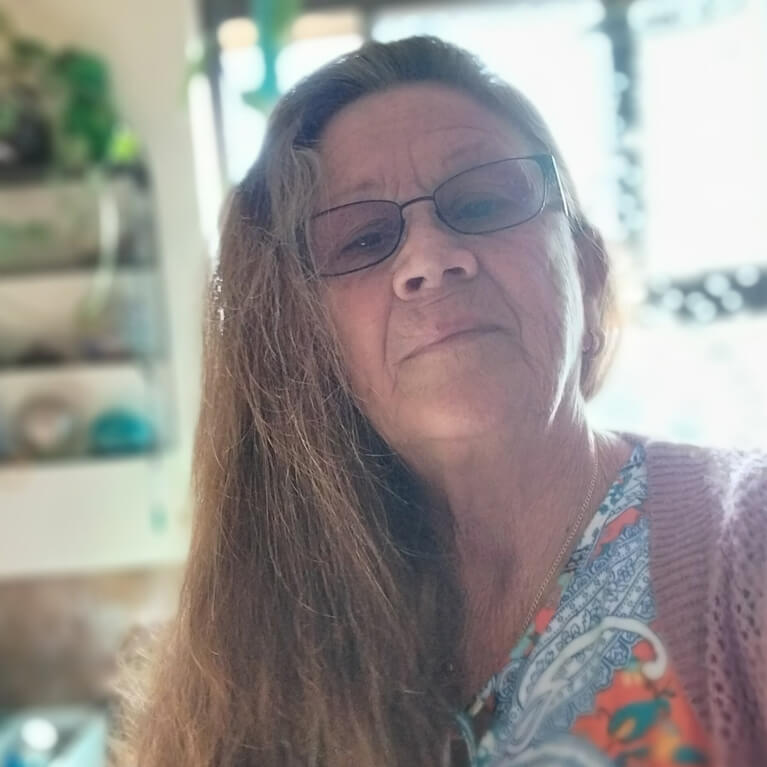
Shirley Batty
Shirley became a war widow in 2024 after the death of her husband, Peter. Peter served 21 years in the Australian Regular Army as an Infantry Soldier, reaching the rank of Warrant Officer Class Two. He served in Malaya, Borneo and South Vietnam, and was awarded campaign and service medals along with the Infantry Combat Badge. Shirley and Peter met in 1977 when he locked himself out of his car, and Shirley, who lived nearby, lent him a coat hanger. It was love at first sight from that moment and from that day they built a life together. After 45 years engaged, they married on…

Shirley became a war widow in 2024 after the death of her husband, Peter. Peter served 21 years in the Australian Regular Army as an Infantry Soldier, reaching the rank of Warrant Officer Class Two. He served in Malaya, Borneo and South Vietnam, and was awarded campaign and service medals along with the Infantry Combat Badge. Shirley and Peter met in 1977 when he locked himself out of his car, and Shirley, who lived nearby, lent him a coat hanger. It was love at first sight from that moment and from that day they built a life together. After 45 years engaged, they married on Peter’s 80th birthday, a lasting testament to their enduring love.
Shirley became a War Widow on 17/05/24 after her husband Peter was fatally injured falling from his roof 5 days earlier. Peter served 21 years in the Australian Regular Army as an Infantry Soldier attaining the rank of Warrant Officer Class Two (WO2). Peter served in Malaya, Borneo and South Vietnam and was awarded campaign and service medals and the Infantry Combat Badge. Peter and Shirley met in July 1977 when Peter was a WO2 and locked himself out of his vehicle. Shirley, who lived nearby, lent him a coat hanger and it was love at first sight from that moment. Peter and Shirley lived together and were engaged for 45 years. To prove their love of each other was strong and enduring they married on Peter’s 80th Birthday.
Full Story
These stories matter
The War Widows Honour Roll is a reminder of the lasting bonds within our community and recognises the resilience, strength, and contributions of war widows. Sharing those stories ensures their lives and legacies are remembered within the defence community and beyond.
